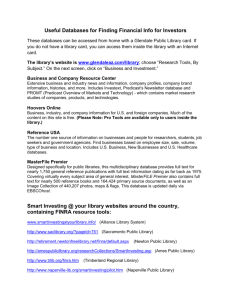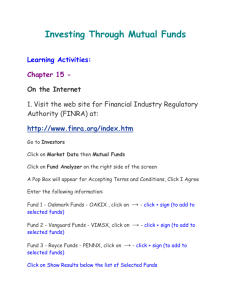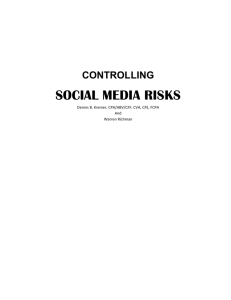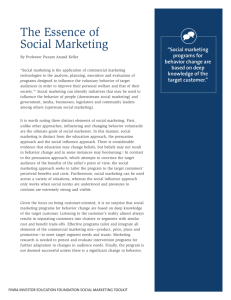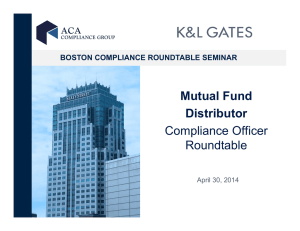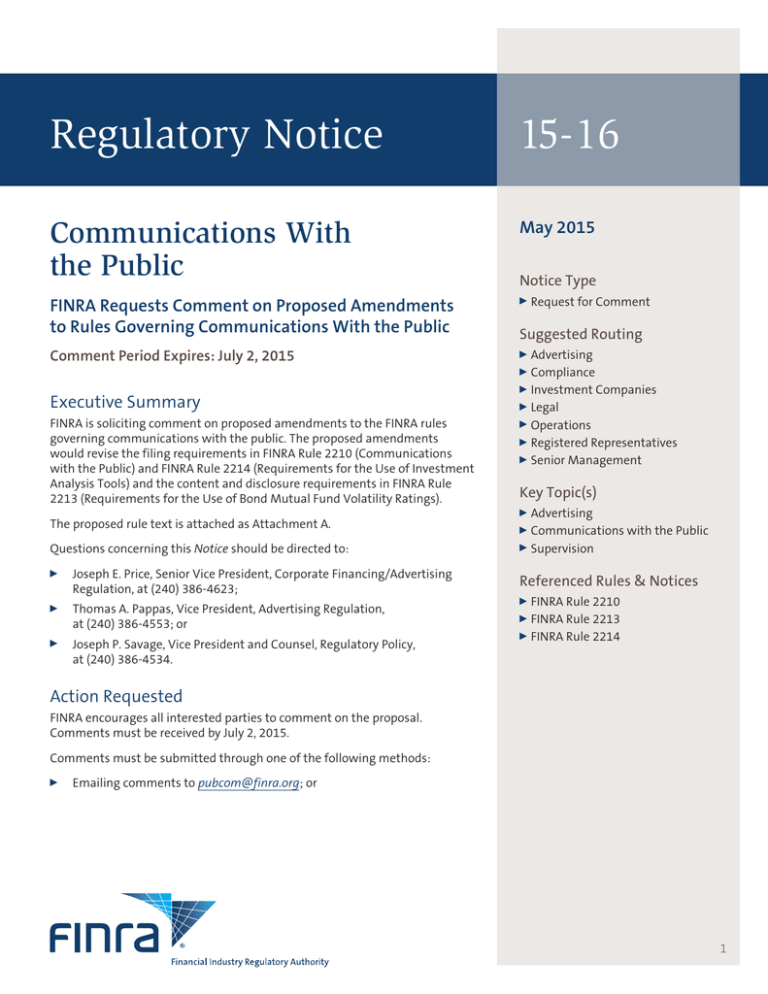
Regulatory Notice
15-16
Communications With
the Public
May 2015
FINRA Requests Comment on Proposed Amendments
to Rules Governing Communications With the Public
00
Comment Period Expires: July 2, 2015
00
Notice Type
Request for Comment
Suggested Routing
Advertising
Compliance
00 Investment Companies
00 Legal
00 Operations
00 Registered Representatives
00 Senior Management
00
Executive Summary
FINRA is soliciting comment on proposed amendments to the FINRA rules
governing communications with the public. The proposed amendments
would revise the filing requirements in FINRA Rule 2210 (Communications
with the Public) and FINRA Rule 2214 (Requirements for the Use of Investment
Analysis Tools) and the content and disclosure requirements in FINRA Rule
2213 (Requirements for the Use of Bond Mutual Fund Volatility Ratings).
Key Topic(s)
Advertising
Communications with the Public
00 Supervision
00
The proposed rule text is attached as Attachment A.
Questions concerning this Notice should be directed to:
00
Joseph E. Price, Senior Vice President, Corporate Financing/Advertising
Regulation, at (240) 386-4623;
00
Thomas A. Pappas, Vice President, Advertising Regulation,
at (240) 386-4553; or
00
Joseph P. Savage, Vice President and Counsel, Regulatory Policy,
at (240) 386-4534.
00
Referenced Rules & Notices
FINRA Rule 2210
FINRA Rule 2213
00 FINRA Rule 2214
00
00
Action Requested
FINRA encourages all interested parties to comment on the proposal.
Comments must be received by July 2, 2015.
Comments must be submitted through one of the following methods:
00
Emailing comments to pubcom@finra.org; or
1
15-16
May 2015
00
Mailing comments in hard copy to:
Marcia E. Asquith
Office of the Corporate Secretary
FINRA
1735 K Street, NW
Washington, DC 20006-1506
To help FINRA process comments more efficiently, persons should use only one method
to comment on the proposal.
Important Notes: All comments received in response to this Notice will be made available to
the public on the FINRA website. In general, FINRA will post comments as they are received.1
Before becoming effective, a proposed rule change must be authorized for filing with the
Securities and Exchange Commission (SEC) by the FINRA Board of Governors, and then
must be filed with the SEC pursuant to Section 19(b) of the Securities Exchange Act of
1934 (SEA).2
Background and Discussion
In April 2014, FINRA launched a retrospective review of its communications with the public
rules to assess their effectiveness and efficiency. In December 2014, FINRA published a
report on the assessment phase of the review.3 The report concluded that, while the rules
have met their intended investor protection objectives, they could benefit from some
updating to better align the investor protection benefits and the economic impacts.
To this end, FINRA recommended a combination of rule proposals, guidance and
administrative measures.
Pursuant to these recommendations, FINRA initially is proposing amendments to the
filing requirements in FINRA Rule 2210 and FINRA Rule 2214 and the content and
disclosure requirements in FINRA Rule 2213.4
Proposed Amendments
New Firm Communications
New FINRA member firms currently are required to file with FINRA retail communications
used in any electronic or other public media at least 10 business days prior to use. This
requirement extends for one year from the effective date of the firm’s membership. This
new firm filing requirement only applies to broadly disseminated retail communications,
such as generally accessible websites, print media communications, and television and
radio commercials.
2
Regulatory Notice
May 2015
The new firm filing requirement predates the Internet, and today new firms primarily
reach customers and potential customers through websites. Accordingly, the review
of these websites has become the most important objective of this filing requirement.
FINRA’s comments on new firm filings typically focus on their websites, particularly the
websites of new firms with novel or unusual business models. FINRA also believes that the
requirement for new firms to file their retail communications at least 10 business days
prior to use unnecessarily delays firms’ abilities to communicate with the public without a
corresponding investor protection benefit beyond what post-use review would provide.
Accordingly, FINRA proposes to narrow the new firm filing requirement by requiring new
firms to file only their websites and material changes to their websites within 10 business
days of first use for a one-year period. FINRA intends to continue to review new firms’
communications for adherence with applicable standards by focusing on new firms’
websites after they are filed with FINRA, and reviewing applicants’ websites as part of the
new firm application process.
Investment Company Shareholder Reports
FINRA has required firms to file the manager’s discussion of fund performance (MDFP)
portion of a registered investment company shareholder report if the report is distributed
or made available to prospective investors. FINRA has required the MDFP to be filed
because firms sometimes distribute or make shareholder reports available to prospective
investors to provide more information about the funds they offer, and thus FINRA has
considered the MDFP to be subject to the filing requirement for investment company retail
communications. Registered investment companies are also required to file their annual
and semi-annual shareholder reports with the SEC.5
Because investment companies already must file shareholder reports with the SEC, and
because the MDFP typically presents less investor risk than other types of promotional
communications concerning investment companies, FINRA proposes to exclude
shareholder reports that have been filed with the SEC from the filing requirements. The
rule already excludes prospectuses, fund profiles, offering circulars and similar documents
that have been filed with the SEC. As such, FINRA believes it would be consistent to add
shareholder reports that have been filed with the SEC to that list.
Backup Material for Investment Company Performance Rankings and Comparisons
Firms that file a retail communication for a registered investment company that contains a
fund performance ranking or performance comparison must include a copy of the ranking
or comparison used in the retail communication. When FINRA adopted this requirement,
prior to the Internet, FINRA staff did not have ready access to the sources of rankings or
comparisons. Today, this information typically is available online. FINRA therefore proposes
to eliminate the requirement to file ranking and comparison backup material and instead
expressly to require firms to maintain back-up materials as part of their records.
Regulatory Notice
3
15-16
15-16
May 2015
Generic Investment Company Communications
Firms must file within 10 business days of first use retail communications “concerning”
registered investment companies. FINRA proposes to exclude from the filing requirements
generic investment company retail communications that do not promote a particular fund
or fund family. An example might include a communication that describes different mutual
fund types and features but does not discuss the benefits of a specific fund or fund family.
This type of material typically is intended to educate the public about investment
companies in general or the types of products that a firm offers, and thus does not
present the same risks of including potentially misleading information as promotional
communications about specific funds or fund families. FINRA is proposing to require
instead the filing of retail communications that “promote or recommend a specific
registered investment company or family of registered investment companies.”
Investment Analysis Tools
“Investment analysis tools” are interactive technological tools that produce simulations and
statistical analyses that present the likelihood of various investment outcomes if certain
investments are made or certain investment strategies or styles are undertaken. Firms that
intend to offer an investment analysis tool must file templates for written reports produced
by, or retail communications concerning, the tool, within 10 business days of first use.
They also must provide FINRA with access to the tool itself, and provide customers with
specific disclosures when they communicate about the tool, use the tool or provide written
reports generated by the tool. In light of the investor protection afforded by other content
standards and the requirement that firms provide access to the tools and their output upon
request of FINRA staff, FINRA proposes to eliminate the filing requirements for investment
analysis tool report templates and retail communications concerning such tools.
Filing Exclusion for Templates
Firms are not required to file retail communications that are based on templates that were
previously filed with FINRA but changed only to update recent statistical or other nonnarrative information. FINRA proposes to expand the template filing exclusion also to allow
firms to include updated non-predictive narrative descriptions of market events during the
period covered by the communication and factual descriptions of portfolio changes without
having to refile the template.
Bond Mutual Fund Volatility Ratings
Firms may use retail communications that include ratings provided by independent third
parties that address the sensitivity of the net asset value of an open-end management
investment company’s bond portfolio to changes in market conditions and the general
economy, subject to a number of requirements. For example, these communications
must be accompanied or preceded by the bond fund’s prospectus and contain specific
disclosures.
4
Regulatory Notice
May 2015
Firms currently must file retail communications that include bond mutual fund volatility
ratings at least 10 business days prior to first use, and withhold them from publication or
circulation until any changes specified by FINRA have been made.
Accordingly, FINRA proposes to modify some of the rule’s requirements. Consistent with the
filing requirements for other retail communications about specific registered investment
companies, the proposal would permit firms to file these communications within 10
business days of first use rather than prior to use. The proposal also would streamline the
content and disclosure requirements and eliminate the requirement that the rating could
only be included in a retail communication that accompanies or is preceded by the bond
fund’s prospectus.
Economic Impact Assessment
The assessment phase of FINRA’s retrospective review of the communications with the
public rules concluded that these rules have been largely effective in meeting their investor
protection goals but there are several areas where the investor protection benefits may
not align with the associated economic costs. For example, the views expressed by the
stakeholders during the assessment suggested that certain filing requirements (e.g., prior
to use filing requirements for new members, filings of investment company shareholder
reports or generic investment company communications, and filing requirements for
investment analysis tools) may be too broad and the direct and indirect costs associated
with such filings may be unnecessarily large.
The amendments in this rule proposal are intended to address opportunities to better
align the protections to investors with the associated risks of the activities and the costs
of compliance.
The proposed amendments would impact firms that are subject to the filing, content and
disclosure requirements in this proposal. Approximately 770 firms filed communications
material with FINRA in 2014. FINRA estimates that about 80 to 90 percent of these firms
filed communications specific to the requirements in this proposal. These firms would be
directly impacted by the proposed amendments.
Anticipated Benefits
The amendments will benefit firms by reducing their costs associated with the specific
requirements in this proposal. These cost savings would include savings on filing fees
from the proposed elimination or reduction in the scope of certain filing requirements.
FINRA reviewed the communications filing history and related comments on the material
filed in 2014. Based on this review, FINRA preliminarily estimates that, as a result of
the proposed amendments, there would be a reduction in filings of new member
communications of approximately 300 filings per year, a decrease in the filings of
Regulatory Notice
5
15-16
15-16
May 2015
investment company shareholder reports of 5,000 filings per year, and a potential decline
in the filings of generic investment company communications of approximately 3,000
filings per year. FINRA further estimates that the anticipated decline in filings related to
investment analysis tools and filings of templates would be approximately 500 and 13,000
filings per year, respectively. Overall, FINRA estimates that as a result of the proposed
amendments, the total communications material filed would decline by 21,800 filings per
year. Accordingly, based on an average filing fee of $185 in 2014, FINRA estimates that the
proposed amendments would reduce the filing fees for firms by approximately $4 million
per year.
In addition to this reduction in filing fees, firms would likely also benefit from a decrease in
other direct costs associated with filings, such as staff, systems and infrastructure costs, or
third-party consulting fees associated with the requirements applicable to this proposal.
The proposed amendments may also enable firms to communicate additional valuable
information to investors (e.g., educational information about mutual funds in general or
bond mutual fund volatility ratings), reduce disruption in the firms’ marketing activities
associated with filings of low-risk communications, and reduce barriers to entry for new
firms by streamlining the filing requirement associated with new firm communications.
The ability to provide additional educational material that permits investors to better
understand the relative risks, costs, strategies and historical performance of mutual funds
may generate a benefit to the public.
Anticipated Costs
Firms that are subject to the filing, content and disclosure requirements in this proposal
would likely incur costs associated with updating their policies and procedures. These
costs would include training their advertising review and other staff. Firms may also need
to update their systems to reflect changes in the filing requirements. FINRA, however,
anticipates that these costs would likely be minimal relative to the cost savings from the
proposed amendments.
FINRA would also incur costs associated with updating its internal systems as well as
training the relevant staff on the amendments in the proposal.
6
Regulatory Notice
May 2015
Other Economic Impacts
The proposed exclusions and streamlining of filing requirements would not diminish
investor protection because the applicable communications are either already subject to
other regulatory reviews or pose little risk to investors, or FINRA believes that investors
can still be protected through a post-use rather than a pre-use filing requirement. For
example, investment company shareholder reports are already filed with the SEC and
subject to regulatory review, and generic investment company retail communications
or non-predictive narrative descriptions about market events in report templates are
low-risk communications. Accordingly, excluding such communications from the filing
requirements would not compromise investor protection.
FINRA notes that some firms choose to file some mutual fund communications on a
voluntary basis. Firms that choose to do so base their decision on business needs and
not FINRA requirements. This proposal would not limit the ability of firms to continue
to make voluntary filings if they should deem them to be valuable.
Request for Comment
FINRA requests comment on all aspects of the proposed amendments to the rules
governing communications with the public, including the appropriate scope of these
amendments and potential impacts on member firms, associated persons and the public.
FINRA requests that commenters provide empirical data or other factual support for their
comments whenever possible. FINRA specifically requests comments concerning the
following issues:
00
In addition to the economic impacts identified in this proposal, are there other
significant sources of impacts, including direct or indirect costs and benefits, of
the proposed amendments? What are these economic impacts and what factors
contribute to them? Please provide data or other supporting evidence.
00
Do firms anticipate altering the delivery method or content of their communications
material as a result of the proposed amendments? If so, how would the firms alter
their communications with the public?
00
Are there other alternative approaches FINRA should consider to accomplish the
goals described in this proposal? If so, what are those alternatives and why are
they better suited?
00
Will firms continue to file communications voluntarily? What is an estimate of the
amount of materials that might continue to be filed voluntarily? Why might firms
continue to file materials that would be exempt from filing under this proposal?
Regulatory Notice
7
15-16
15-16
May 2015
Endnotes
1.
FINRA will not edit personal identifying
information, such as names or email addresses,
from submissions. Person should submit only
information that they wish to make publicly
available. See Notice to Members 03-73
(November 2003) (Online Availability of Comments) for more information. 2.
See SEA Section 19 and rules thereunder. After a
proposed rule change is filed with the SEC, the
proposed rule change generally is published for
public comment in the Federal Register. Certain
limited types of proposed rule changes, however,
take effect upon filing with the SEC. See SEA
Section 19(b)(3) and SEA Rule 19b-4.
3.
4.
Stakeholders commenting on the retrospective
rule review also recommended that FINRA
revise Rule 2210’s content standards to address
other issues, such as the amount of disclosure
required in communications with the public,
the standards applicable to the presentation
of performance, and the standards governing
online, mobile and social media communications.
FINRA is considering whether to propose
additional changes to Rule 2210 in response to
these comments.
5.
See Section 30 of the Investment Company Act of
1940 and Rules , 30b1-1 and 30b2-1 thereunder.
See Retrospective Rule Report, Communications
with the Public, December 2014.
© 2015 FINRA. All rights reserved. FINRA and other trademarks of the Financial Industry Regulatory Authority, Inc.
may not be used without permission. Regulatory Notices attempt to present information to readers in a format
that is easily understandable. However, please be aware that, in case of any misunderstanding, the rule language
prevails.
8
Regulatory Notice
May 2015
ATTACHMENT A
Below is the text of the proposed rule change. Proposed new language is underlined; proposed deletions are in
brackets. *****
2000. DUTIES AND CONFLICTS
*****
2200. COMMUNICATIONS AND DISCLOSURES
2210. Communications with the Public
(a) No Change.
(b) Approval, Review and Recordkeeping
(1) through (3) No Change.
(4) Recordkeeping
(A) Members must maintain all retail communications and institutional
communications for the retention period required by SEA Rule 17a-4(b) and in a
format and media that comply with SEA Rule 17a-4. The records must include:
(i) a copy of the communication and the dates of first and (if applicable)
last use of such communication;
(ii) the name of any registered principal who approved the communication
and the date that approval was given;
(iii) in the case of a retail communication or an institutional
communication that is not approved prior to first use by a registered principal,
the name of the person who prepared or distributed the communication;
(iv) information concerning the source of any statistical table, chart, graph
or other illustration used in the communication; [and]
(v) for any retail communication for which principal approval is not
required pursuant to paragraph (b)(1)(C), the name of the member that
filed the retail communication with the Department, and a copy of the
corresponding review letter from the Department and;
Regulatory Notice
9
15-16
15-16
May 2015
(vi) for any retail communication that includes or incorporates a
performance ranking or performance comparison of a registered investment
company, a copy of the ranking or performance used in the
retail communication.
(B) Members must maintain all correspondence in accordance with the recordkeeping requirements of Rules 3110.09 and 4511.
(c) Filing Requirements and Review Procedures
(1) Requirement for Certain Members to File Retail Communications
(A) For a period of one year beginning on the date reflected in the Central
Registration Depository (CRD®) system as the date that FINRA membership
became effective, the member must file with the Department [at least] within 10
business days [prior to] of first use [any retail communication that is published or
used in any electronic or other public media, including] any generally accessible
website[, newspaper, magazine or other periodical, radio, television, telephone or
audio recording, video display, signs or billboards, motion pictures, or telephone
directories (other than routine listings). To the extent any retail communication
that is subject to this filing requirement is a free writing prospectus that has been
filed with the SEC pursuant to Securities Act Rule 433(d)(1)(ii), the member may file
such retail communication within 10 business days of first use rather than at least
10 business days prior to first use].
(B) Notwithstanding the foregoing provisions, if the Department determines
that a member has departed from the standards of this Rule, it may require
that such member file all communications, or the portion of such member’s
communications that is related to any specific types or classes of securities or
services, with the Department at least 10 business days prior to first use. The
Department will notify the member in writing of the types of communications
to be filed and the length of time such requirement is to be in effect. Any filing
requirement imposed under this subparagraph will take effect 21 calendar days
after service of the written notice, during which time the member may request a
hearing under Rules 9551 and 9559.
10
Regulatory Notice
May 2015
(2) Requirement to File Certain Retail Communications Prior to First Use
At least 10 business days prior to first use or publication (or such shorter period as
the Department may allow), a member must file the following retail communications
with the Department and withhold them from publication or circulation until any
changes specified by the Department have been made:
(A) Retail communications concerning registered investment companies
(including mutual funds, exchange-traded funds, variable insurance products,
closed-end funds and unit investment trusts) that include or incorporate
performance rankings or performance comparisons of the investment company
with other investment companies when the ranking or comparison category is not
generally published or is the creation, either directly or indirectly, of the investment
company, its underwriter or an affiliate. Such filings must include a copy of the
data on which the ranking or comparison is based.
(B) Retail communications concerning security futures. The requirements of
this paragraph (c)(2)(B) shall not be applicable to:
(i) retail communications concerning security futures that are submitted
to another self-regulatory organization having comparable standards
pertaining to such retail communications; and
(ii) retail communications in which the only reference to security futures is
contained in a listing of the services of a member.
[(C) Retail communications concerning bond mutual funds that include or
incorporate bond mutual fund volatility ratings, as defined in Rule 2213.]
(3) Requirement to File Certain Retail Communications
Within 10 business days of first use or publication, a member must file the
following communications with the Department:
(A) Retail communications [concerning] that promote or recommend a
specific registered investment company or family of registered investment
companies (including mutual funds, exchange-traded funds, variable insurance
products, closed-end funds, and unit investment trusts) not included within the
requirements of paragraphs (c)(1) or (c)(2). [The filing of any retail communication
that includes or incorporates a performance ranking or performance comparison of
the investment company with other investment companies must include a copy of
the ranking or comparison used in the retail communication.]
Regulatory Notice
11
15-16
15-16
May 2015
(B) Retail communications concerning public direct participation programs (as
defined in Rule 2310).
[(C) Any template for written reports produced by, or retail communications
concerning, an investment analysis tool, as such term is defined in Rule 2214.]
([D]C) Retail communications concerning collateralized mortgage obligations
registered under the Securities Act.
([E]D) Retail communications concerning any security that is registered under
the Securities Act and that is derived from or based on a single security, a basket
of securities, an index, a commodity, a debt issuance or a foreign currency, not
included within the requirements of paragraphs (c)(1), (c)(2) or subparagraphs (A)
through ([D]C) of paragraph (c)(3).
(4) Filing of Television or Video Retail
If a member has filed a draft version or “story board” of a television or video retail
communication pursuant to a filing requirement, then the member also must file the
final filmed version within 10 business days of first use or broadcast.
(5) Date of First Use and Approval Information
A member must provide with each filing the actual or anticipated date of first use,
the name, title and Central Registration Depository (CRD®) number of the registered
principal who approved the retail communication, and the date that the approval was
given.
(6) Spot-Check Procedures
In addition to the foregoing requirements, each member’s written (including
electronic) communications may be subject to a spot-check procedure. Upon written
request from the Department, each member must submit the material requested in a
spot-check procedure within the time frame specified by the Department.
(7) Exclusions from Filing Requirements
The following communications are excluded from the filing requirements of
paragraphs (c)(1) through (c)(4):
(A) Retail communications that previously have been filed with the
Department and that are to be used without material change.
12
Regulatory Notice
May 2015
(B) Retail communications that are based on templates that were previously
filed with the Department the changes to which are limited to updates of more
recent statistical or other non-narrative information and non-predictive narrative
information that describes market events during the period covered by the
communication or factual changes in portfolio composition.
(C) Retail communications that do not make any financial or investment
recommendation or otherwise promote a product or service of the member.
(D) Retail communications that do no more than identify a national securities
exchange symbol of the member or identify a security for which the member is a
registered market maker.
(E) Retail communications that do no more than identify the member or offer
a specific security at a stated price.
(F) Prospectuses, preliminary prospectuses, fund profiles, offering circulars,
annual or semi-annual reports and similar documents that have been filed with
the SEC or any state, or that is exempt from such registration, and free writing
prospectuses that are exempt from filing with the SEC, except that an investment
company prospectus published pursuant to Securities Act Rule 482 and a free
writing prospectus that is required to be filed with the SEC pursuant to Securities
Act Rule 433(d)(1)(ii) will not be considered a prospectus for purposes of this
exclusion.
(G) Retail communications prepared in accordance with Section 2(a)(10)(b)
of the Securities Act, as amended, or any rule thereunder, such as Rule 134, and
announcements as a matter of record that a member has participated in a private
placement, unless the retail communications are related to publicly offered direct
participation programs or securities issued by registered investment companies.
(H) Press releases that are made available only to members of the media.
(I) Any reprint or excerpt of any article or report issued by a publisher
(“reprint”), provided that:
(i) the publisher is not an affiliate of the member using the reprint or any
underwriter or issuer of a security mentioned in the reprint that the member is
promoting;
(ii) neither the member using the reprint nor any underwriter or issuer of
a security mentioned in the reprint has commissioned the reprinted article or
report; and
Regulatory Notice
13
15-16
15-16
May 2015
(iii) the member using the reprint has not materially altered its contents
except as necessary to make the reprint consistent with applicable regulatory
standards or to correct factual errors.
(J) Correspondence.
(K) Institutional communications.
(L) Communications that refer to types of investments solely as part of a
listing of products or services offered by the member.
(M) Retail communications that are posted on an online interactive electronic
forum.
(N) Press releases issued by closed-end investment companies that are listed
on the New York Stock Exchange (NYSE) pursuant to section 202.06 of the NYSE
Listed Company Manual (or any successor provision).
(O) Research reports as defined in NASD Rule 2711 that concern securities that
are listed on a national securities exchange, other than research reports required
to be filed with the Commission pursuant to Section 24(b) of the Investment
Company Act.
(8) Communications Deemed Filed with FINRA
Although the communications described in paragraphs (c)(7)(H) through
(K) are excluded from the foregoing filing requirements, investment company
communications described in those paragraphs shall be deemed filed with FINRA for
purposes of Section 24(b) of the Investment Company Act and Rule 24b-3 thereunder.
(9) Filing Exemptions
(A) Pursuant to the Rule 9600 Series, FINRA may exempt a member from the
pre-use filing requirements of paragraph (c)(1)(A) for good cause shown.
(B) Pursuant to the Rule 9600 Series, FINRA may conditionally or
unconditionally grant an exemption from paragraph (c)(3) for good cause shown
after taking into consideration all relevant factors, to the extent such exemption is
consistent with the purposes of the Rule, the protection of investors, and the public
interest.
(d) through (g) No Change.
*****
14
Regulatory Notice
May 2015
2213. Requirements for the Use of Bond Mutual Fund Volatility
Ratings
(a) Definition of Bond Mutual Fund Volatility Ratings
For purposes of this Rule and any interpretation thereof, the term “bond mutual
fund volatility rating” is a description issued by an independent third party relating to the
sensitivity of the net asset value of a portfolio of an open-end management investment
company that invests in debt securities to changes in market conditions and the general
economy, and is based on an evaluation of objective factors, including the credit quality
of the fund’s individual portfolio holdings, the market price volatility of the portfolio, the
fund’s performance, and specific risks, such as interest rate risk, prepayment risk, and
currency risk.
(b) Prohibitions on Use
Members and persons associated with a member may distribute a retail
communication that includes [use]a bond mutual fund volatility rating [only in a
communication that is accompanied or preceded by a prospectus for the bond mutual fund
(“supplemental sales literature”) and]only when the following requirements are satisfied:
(1) The rating does not identify or describe volatility as a “risk” rating.
(2) The retail communication[supplemental sales literature] incorporates the most
recently available rating and reflects information that, at a minimum, is current to the
most recently completed calendar quarter ended prior to use.
(3) The criteria and methodology used to determine the rating must be based
exclusively on objective, quantifiable factors. The rating and the Disclosure Statement
that accompanies the rating must be clear, concise, and understandable.
(4) The retail communication[supplemental sales literature] conforms to the
disclosure requirements described in paragraph (c).
(5) The entity that issued the rating provides detailed disclosure on its rating
methodology to investors through a toll-free telephone number, a website, or both.
(c) Disclosure Requirements
[(1) Supplemental sales literature containing a bond mutual fund volatility rating
shall include a Disclosure Statement containing all the information required by this
Rule. The Disclosure Statement may also contain any additional information that is
relevant to an investor’s understanding of the rating.]
Regulatory Notice
15
15-16
15-16
May 2015
[(2) Supplemental sales literature containing a bond mutual fund volatility rating
shall contain all current bond mutual fund volatility ratings that have been issued with
respect to the fund. Information concerning multiple ratings may be combined in the
Disclosure Statement, provided that the applicability of the information to each rating
is clear.]
([3]1) [All bond mutual fund volatility ratings shall be contained within the text of
the Disclosure Statement.] The following disclosures shall be provided with respect to
each [such] bond mutual fund volatility rating:
(A) the name of the entity that issued the rating;
(B) the most current rating and date of the current rating[, with an
explanation of the reason for any change in the current rating from the most
recent prior rating];
(C) a link to, or website address for, a website that includes the criteria and
methodologies used to determine the rating;
([C]D) a description of the rating in narrative form, containing the following
disclosures:
(i) a statement that there is no standard method for assigning ratings;
[(ii) a description of the criteria and methodologies used to determine
the rating;]
[(iii) a statement that not all bond funds have volatility ratings;]
(ii[v]) whether consideration was paid in connection with obtaining
the issuance of the rating;
(iii[v]) a description of the types of risks the rating measures
(e.g., short-term volatility); and
[(vi) a statement that the portfolio may have changed since the date
of the rating; and]
(iv[ii]) a statement that there is no guarantee that the fund will continue
to have the same rating or perform in the future as rated.
16
Regulatory Notice
May 2015
2214. Requirements for the Use of Investment Analysis Tools
(a) General Considerations
This Rule provides a limited exception to Rule 2210(d)(1)(F). No member may
imply that FINRA endorses or approves the use of any investment analysis tool or any
recommendation based on such a tool. A member that offers or intends to offer an
investment analysis tool under this Rule (whether customers use the member’s tool
independently or with assistance from the member) must, within 10 business days of first
use[, (1)] provide FINRA’s Advertising Regulation Department (“Department”) access to the
investment analysis tool [and, (2) pursuant to Rule 2210(c)(3)(D), file with the Department
any template for written reports produced by, or retail communications concerning, the
tool].
(b) through (d) No Change
• • • Supplementary Material: -------------.01 through .07 No Change.
*****
Regulatory Notice
17
15-16

